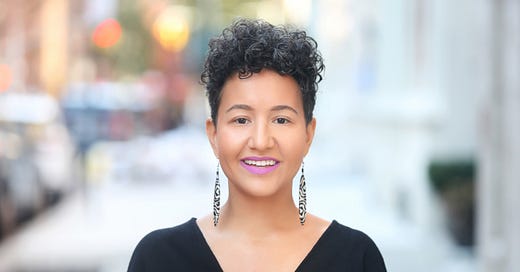"What Do I Do With This Thing?"
An Interview with Dr. Riana Anderson About Helping Black Kids Navigate Racist Encounters
Earlier this year, after I wrote in the New York Times about racist humor among teens, I heard from a couple of people who could offer actual solutions to the problem. One of them was Dr. Riana Elyse Anderson, a clinical psychologist and 2023-24 Fellow at Harvard University's Hutchins Center for African and African American Research, who has made it her life’s mission to combat the impacts of racial stress. Dr. Anderson is developing an app called Teens Navigating the Talk (TNT) which is designed to help teens of color combat the negative mental health effects of racism. (The app is now in the testing phase.)
The impacts of those daily racist encounters are growing as social media amplifies the reach of racist discourse. Last year, researchers from Johns Hopkins Bloomberg School of Public found that the suicide rate in Black children and teens aged ten to seventeen increased by 144% between 2007 and 2020, more than any other ethnic group. A 2024 study published in JAMA Psychiatry found that online racism contributed to the development of symptoms of post-traumatic stress disorder in Black adolescents. Those symptoms can include feeling isolated, hyper-vigilant, and having intrusive thoughts, as well as more general symptoms of depression, anxiety, and sleeplessness.
Our conversation has been lightly edited for clarity and conciseness.
Dashka Slater:
A lot of my work has been focused on trying to get kids who aren't Black to not be imposing discriminatory experiences on Black kids. You’re coming at the problem from the other side. So tell me a little bit about the skills you're trying to build for Black teens and other teens of color who are recipients of discrimination.
Riana Elyse Anderson:
What our lab and our work is trying to say is: it's really hard to prevent racism or discrimination writ large; it’s very hard to protect your child from all the dangers of society; but we can keep them emotionally safe. And these are some of the strategies that we try to practice with them.
Dashka Slater:
I sometimes hear from schools that are worried about even raising the topic of racialized harm with their students for fear of contributing to it. So how do you help kids name their experiences and support them in a way that cultivates resilience?
Riana Elyse Anderson:
The biggest challenge with respect to race and racism is that we try so desperately not to talk about it. So when you think about what victimization can be, if you're not willing to talk about such a central identity for young people and something bad happens with that identity and they're left to their own devices to try to figure it out, that might lend itself more to victimization. Because the question might be, “Well, how come this isn't happening to anyone else? Why is it just me? Why can't I figure out what to do with this?”
Dashka Slater:
What are the skills that you want young people to have, given that the average black teen is experiencing five instances of discrimination per day. That’s a lot that they have to figure out how to navigate while they're doing all their other developmental tasks!
“The biggest challenge with respect to race and racism is that we try so desperately not to talk about it. If you're not willing to talk about such a central identity for young people and something bad happens with that identity and they're left to their own devices to try to figure it out, that might lend itself more to victimization.”
Riana Elyse Anderson:
So the app that we developed is essentially looking at, for young people, if they didn't have a parent or a clinician or anyone else in the world to talk to them, and if we wanted them just to have a set of things that they're going to go through the world doing, what would we want those things to be? And we boiled it down to Knowledge, Awareness, and Skills, which are coping strategies.
Dashka Slater:
Can you explain more about what those words mean in this context?
Riana Elyse Anderson:
So the Knowledge piece is knowing that they're not the only one. Knowing the history, knowing prevalence rates, knowing that this is not a unique phenomenon. Having definitions, having terms, having words.
Dashka Slater:
Being able to name their experience, in other words, or put it context.
Riana Elyse Anderson:
When you work with young people and you ask, have you experienced discrimination? They often say no. And then when you give examples, they say “Oh, yeah, yeah, that happened to me yesterday.” So once once they have words, terms, definitions, they understand this is part of a greater sphere. It's not just the KKK burning a cross on your lawn, which is what you might get taught in schools. So once they have a language around it and a knowledge around prevalence, terms, experiences, history, they seem to be able to have that internal dialogue a bit better for themselves as well. So Knowledge is the first thing. Taking that Knowledge and applying it to the self is Awareness.
Keep reading with a 7-day free trial
Subscribe to A Sigh of Relief: Talking About Justice & Accountability to keep reading this post and get 7 days of free access to the full post archives.




